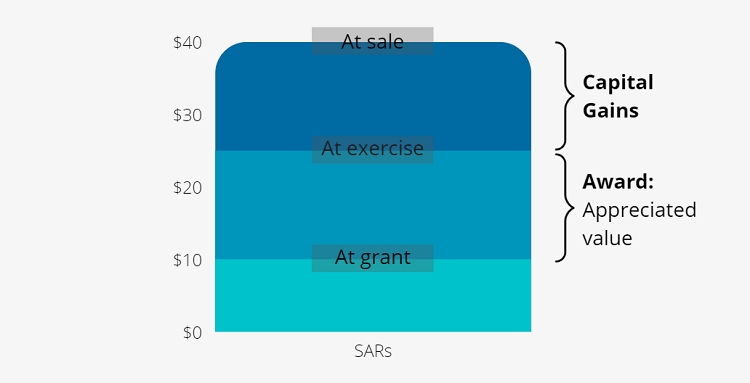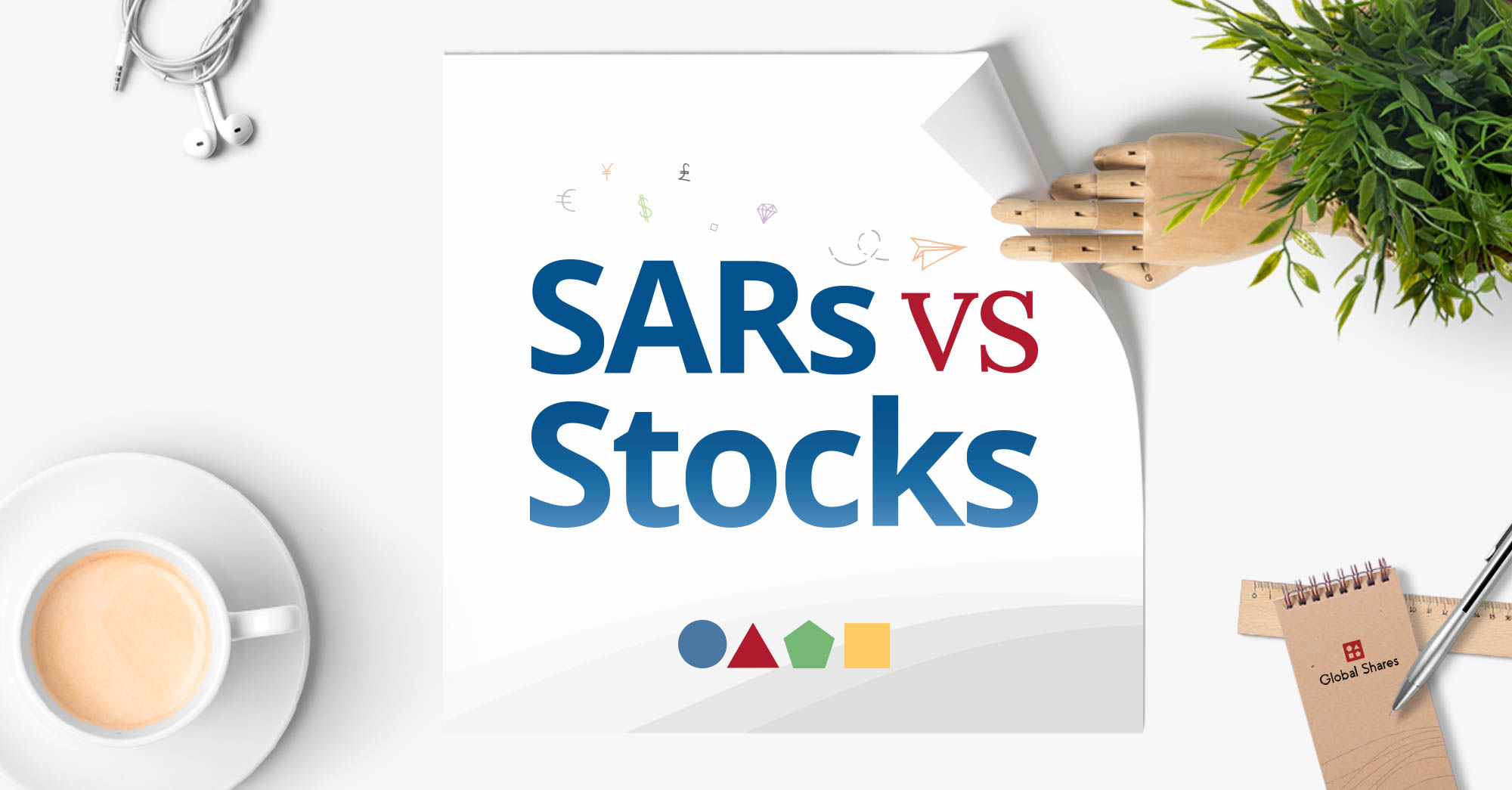There’re many different forms of employee equity compensation. Today, we’re going to discuss stock appreciation rights (SARS) and how it’s similar to and different from Stock Options.
What are Stock Appreciation Rights (SARs)?
Stock appreciation rights (SARs) are a type of equity compensation that ties to your company’s stock price to motivate and retain employees. It provides the holder with the ability to profit from the appreciation in the value of the awards.
When thinking of SARs, always focus on the ‘Appreciation’ part. That’s because SARs are rewarded based on the appreciated value – the difference between the stock price at the time you were granted and the price at the time you get them.
Don’t get confused by the name ‘’Rights‘’, these “rights” do not include rights to dividends or voting rights.
How do stock appreciation rights work?
Grant: Like stock options, SARs are granted at a set price which is used to calculate the appreciated value at the time you receive them.
Vesting: Similar to stock options, SARs often have a vesting period (i.e. a waiting period before gaining the award ownership) and expiration date. Once a SAR vests, employees can exercise (purchase) it anytime before its expiration date.
Exercising/Receiving: Unlike stock options that require employees to pay an exercise price (or called purchase price), employees DO NOT need to make any upfront payment to receive the awards
When you want to receive your SARs, you typically notify your company according to the procedures in your stock plan or grant agreement. You will get the proceeds of a stock increase either in cash or in an equivalent number of company shares.

Example of Jane who is granted 100 SARs:
At the time of the grant, the stock price is £50. After vesting, the stock price is £66 and Jane wants to receive the award at this time. So, each of Jane’s SAR is worth £16 (£66 – £50), meaning she is awarded £16 x 100 = £1,600.
If the amount is paid out in a form of cash, Jane will receive £1,600 in cash. If it is paid out in shares, she will receive 24 shares (£1,600 / £66). Again, Jane can get this £1600 benefit without having to pay for the SARs.
Stock appreciation rights taxation
Like non-qualified stock options (NSOs), you, as an employee, don’t have to report anything for tax purposes until you exercise.
Let’s check each stage of the SAR life cycle:
Grant: Like stock options, there are no federal income tax consequences when you are granted SARs.
Vesting: Again, no tax consequences at the time of vesting like options.
Exercising: The appreciated value gets taxed as earned income and is subject to payroll tax. The appreciation is the difference between the market price at receiving awards and the market price at grant, multiplied by the number of SARs received. Using Jane’s example:
Taxable income: £1600 [(£66 – £50) x 100]
Sale: If you receive shares of stock after vesting and then decide to sell, you may owe capital gains tax. Sticking with the same example, if Jane decides to sell her SARs for $70, post-exercise share price appreciation will be taxable as short-term/long-term capital gain.
Capital Gains: £96 = (£70 – £66) x 24
(Note: You must hold your SARs for at least 1 year after exercise to have the sale proceeds taxed favorably as long-term capital gain)
What happens to my stock appreciation rights if I leave my employer
Generally, termination (e.g. retirement, injury and changing job) triggers the acceleration of SAR expiration, depending on your employer’s plan rules. You typically have limited time to exercise the vested awards.
Benefits of Stock Appreciation Rights to employers
The benefits of SARs for employers can be summed up in a few words; flexibility and less dilution of shares. This is without taking into consideration the primary aims of employee equity compensation – motivating, retaining and attracting talent.
- Flexibility: You can plan SARs in varied ways to suit different individuals e.g. via vesting rules and how to pay out the SARs – cash or shares
- Less dilution of stock: SARs provide employers with a means of offering employees equity-linked compensation without the need to dilute their stock because they require the issuance of fewer company shares.
- Motivate, reward, retain and attract talent: You can determine the vesting schedule on an individual basis to achieve these purposes.
- Favorable accounting rules: Stock-settled SARs receive fixed accounting treatment instead of variable and are treated in much the same manner as conventional stock option plans.
Benefits of Stock Appreciation Rights to employees
The biggest benefit for employees when it comes to SARs is that they don’t have to invest their own earnings to buy stock (or stock options) in the first place.
Employees will benefit from the SARs when the company’s stock price rises and they receive the sum of the increase in stocks or cash (usually the latter). However, if the stock price doesn’t rise, then the promised reward won’t materialise.
In other words, employees don’t take any real risk with SARs but are also subject to stock market fluctuations.
Stock Appreciation Rights vs Stock Options – Compared
So far, we’ve seen some similarities between SARS and Stock Options as we discuss. Let’s look at them first:
- SARs and stock options are a type of equity compensation based on stock price increase (i.e. appreciated value)
- Both SARs and Stock Options are granted at a set price
- They both will generally have a vesting period (time-based or performance-based) and an expiration date
- Both can be awarded in the form of shares (although it’s more common with SARs to be awarded via a cash bonus)
- Since stock options and SARs don’t represent actual shares, no voting rights arise when granted.
There are significant differences, however:
| SARs | Stock Options |
|---|---|
| SARs are granted at a set price. After vesting, employees can exercise/receive the award without having to pay for it before expiration. | Options are granted at a set price. After vesting, employees have the right to exercise the award at the set price before the expiration. |
| Employees don’t have to directly purchase shares of a company’s stock | Employees have the option (right) to purchase shares after vesting |
| Employees can be paid in cash or stock shares* when they’re exercised | Employees are awarded in stock shares when they’re exercised |
| Taxation is similar to NSOs | Taxation depends on whether NSOs or ISOs are received |
| Less dilutive than stock options | Dilution can happen |
| Can be given to anyone | ISO: can be given to employees only; NSO: can be given to anyone |
*If awards are paid out in shares, employees will want to sell the shares, at least in sufficient amounts to pay their taxes.
- Does the company just make a promise to pay, or does it really put aside the funds?
- If the award is paid in stock, is there a market for the stock?
SAR vs Stock Options – Which is Best for You?
You probably won’t be too surprised when the answer to the question, ‘which is best for you?’, is ‘it depends’.
The reason why these two similar, but different, things came into being is to suit different types of needs.
SARs are likely suitable for you if:
- You are a business that is limited in your ability to award stock.
- You prefer to save your employees from having to pay for an award
- Company’s shareholders wish to reduce stock dilution issues
Stock options might be considered if:
- A company prefers to use a traditional equity award
- Company’s employees prefer to decide whether they want to exercise or not their stock options after vesting
- Company’s employees prefer to delay tax events until selling their shares (applicable for ISOs only)
At Global Shares, we handle all the equity award administration so you’ve nothing to worry about. Get in touch to find out how we can assist with equity design and management.
Please Note: This publication contains general information only and Global Shares is not, through this article, issuing any advice, be it legal, financial, tax-related, business-related, professional or other. The Global Shares Academy is not a substitute for professional advice and should not be used as such. Global Shares does not assume any liability for reliance on the information provided herein.








